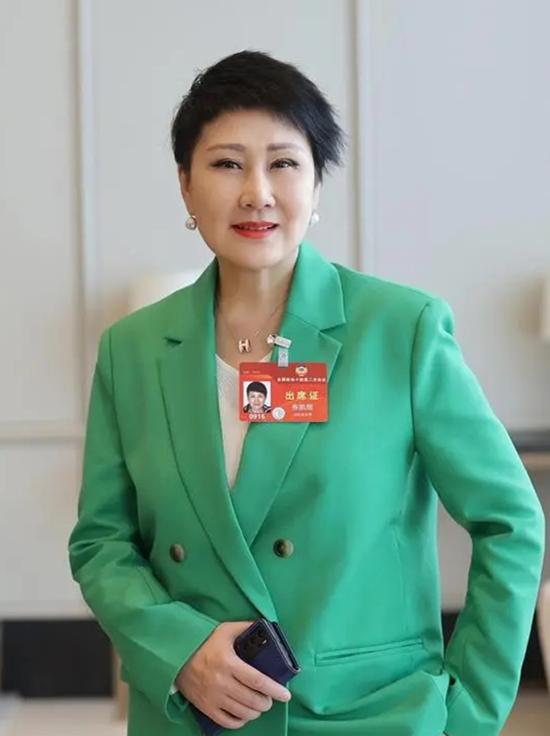
 0 Comment(s)
0 Comment(s) Print
Print E-mail China.org.cn, March 11, 2024
E-mail China.org.cn, March 11, 2024
A national political advisor has suggested strengthening the regulation and supervision of micro-drama productions while providing incentives to promote the healthy development of this increasingly popular form of entertainment.

Zhang Kaili, a member of the 14th National Committee of the Chinese People's Political Consultative Conference (CPPCC) and a renowned actress, poses for a photo during her time attending the annual session of the national political advisory body in Beijing, March 8, 2024. [Photo provided to China.org.cn]
Zhang Kaili, a member of the 14th National Committee of the Chinese People's Political Consultative Conference (CPPCC) and a renowned actress, noted the rapid growth of micro-dramas and their increasing popularity. "In recent years, a series of high-quality micro-dramas have been released, indicating that the industry is evolving in a healthy and orderly manner."
Statistics show that the National Radio and Television Administration registered 2,775 micro-dramas in 2022, a staggering 600% increase from the previous year. From January to November 2023, the count had already reached 2,581. A report by data analysis firm iiMedia Research indicates that the online micro-drama industry's market size in China hit 37.39 billion yuan ($5.2 billion) in 2023. It forecasts that the market size will exceed 50 billion yuan in 2024 and 100 billion yuan by 2027.
Zhang Yiwu, a professor of Chinese studies at Peking University and also a political advisor, stated that micro-dramas "meet the current audience's needs" and represent an important trend in the future development of film, television, and the internet.
However, the micro-drama industry is still grappling with issues such as inconsistent quality. Additionally, some micro-dramas have sparked public controversy due to their inclusion of vulgar, trite, and pandering content.
Zhang Kaili offered several suggestions in her proposal submitted to the second session of the 14th CPPCC National Committee. She emphasized the need for stronger regulatory management and more thorough platform reviews to create a healthy and clean online audio-visual environment. Moreover, she recommended establishing a public welfare platform dedicated to micro-drama content creation, along with a system for industry exchange and copyright transactions.
She also called for the establishment of awards to recognize and motivate exceptional micro-drama creators, while calling for stringent copyright regulations to safeguard their rights and interests. Additionally, she proposed the promotion of micro-dramas with realistic themes, leveraging their unique attributes such as brevity, clarity, quick production, and wide dissemination to spread positive messages.
Regarding micro-dramas' impact on TV dramas, Zhang expressed her belief that each has its own strengths. She sees micro-dramas as both a challenge and a catalyst for the television industry, emphasizing that longer TV dramas should strive to improve and enhance their quality while evolving alongside micro-dramas.
Chinese micro-dramas have also found popularity in overseas markets, becoming a significant cultural export. "The international expansion of Chinese film and television dramas, along with Chinese literary and artistic works, can more effectively connect the emotions of the Chinese people with those from other countries around the world, using culture as a bridge and bond. I hope that more high-quality Chinese films and television shows will gain recognition and affection from a wider international audience."
Zhang Kaili also commented on OpenAI's recent release of the large video model, Sora, in February 2024, which could influence future film and TV productions. While she found it "incredible," she questioned whether it can possess and express human emotions. However, she acknowledged that artificial intelligence will definitely affect human life and emphasized that people should confront it, accept it and learn to coexist with it, using it for beneficial purposes.
Go to Forum >>0 Comment(s)